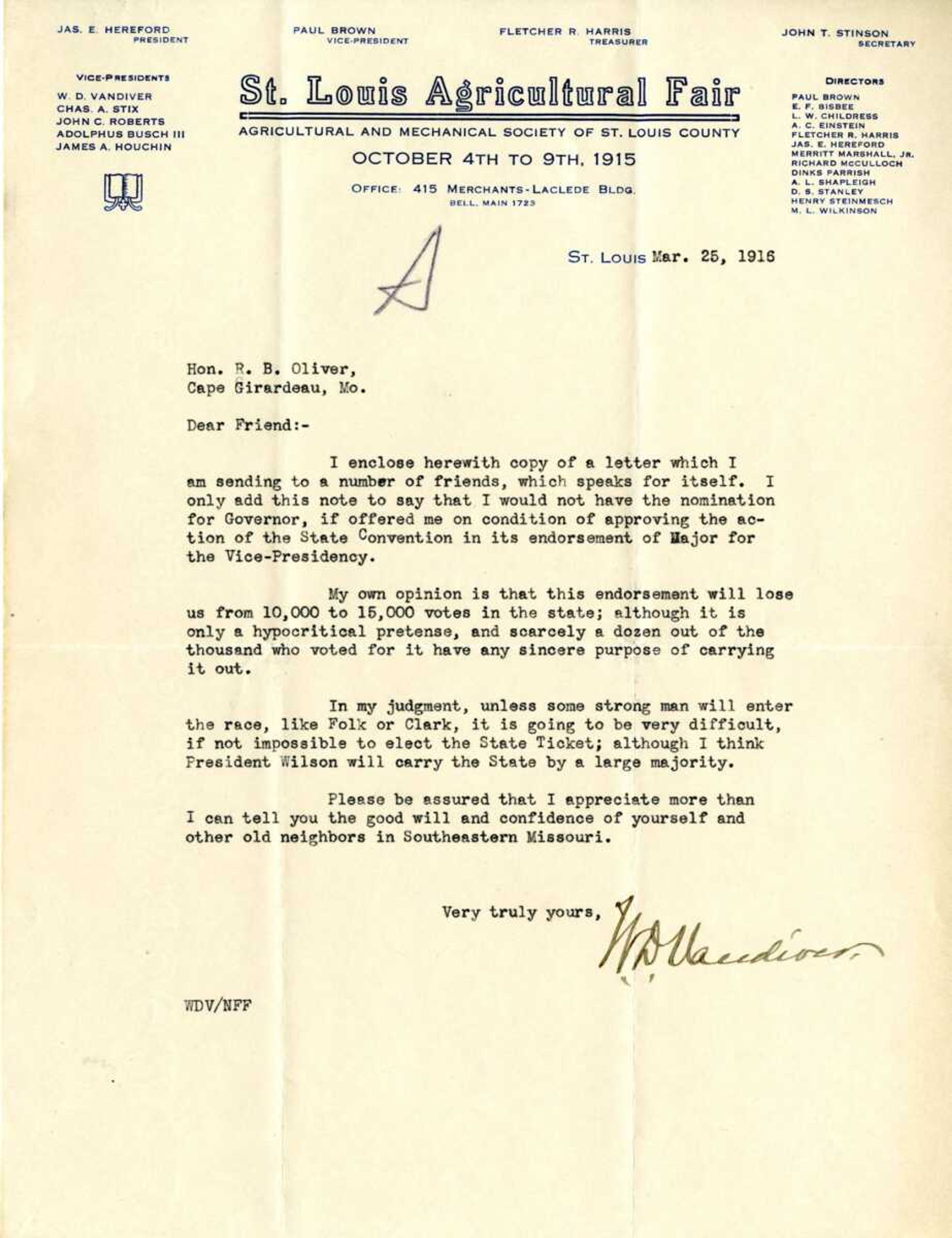Willard D. Vandiver and Missouri governor's race of 1916
Former U.S. congressman Willard Duncan Vandiver is best known for popularizing Missouri's motto "The Show-Me State" in a speech he gave in 1899. He was a lifelong Democrat who served the citizens of Missouri from 1897 to 1905 as representative. He decided to not be re-nominated in 1904, working instead as State Insurance commissioner for five years before becoming assistant U.S. Treasurer in St. Louis in 1913...
Former U.S. congressman Willard Duncan Vandiver is best known for popularizing Missouri's motto "The Show-Me State" in a speech he gave in 1899. He was a lifelong Democrat who served the citizens of Missouri from 1897 to 1905 as representative. He decided to not be re-nominated in 1904, working instead as State Insurance commissioner for five years before becoming assistant U.S. Treasurer in St. Louis in 1913.
In February 1916 Vandiver wrote to Cape Girardeau attorney Robert B. Oliver Sr., that in the coming days he would announce his candidacy for governor on the Democratic ticket and asked for his support. Oliver replied on Feb. 15, "I believe your experience in state affairs and your training and life well fit you for the high and distinguished honor, and I shall be glad to support you." Two days later, Vandiver announced his entrance as a nominee for Missouri governor to the Democratic State Convention. He felt he could get into the race when he did because former Gov. Joseph W. Folk, who he served as his political advisor, declined to run.
Vandiver kicked off his campaign on the steps Cape Girardeau County courthouse, where he began his first race for U.S. Congress in 1896. There were several Democratic nominees already in the race, including John M. Atkinson, Frederick D. Gardner and Francis M. Wilson. Vandiver got into the race because he felt "that the time had come for some things to be done for the public instead of for the politicians, and these things I felt competent to do." In other words, Vandiver wanted to set himself apart as being not a partisan politician who always was seeking the next higher office but a man who would put the citizens of Missouri first.
The Democratic State Convention held its meeting in St. Joseph on March 21 to elect delegates to vote for President Woodrow Wilson's nomination for president. They also endorsed Gov. Elliot Woolfolk Major for the vice presidency.
A few days after the convention, Vandiver wrote Oliver that he was going to withdraw from being a candidate for governor in reaction to the state convention nominating Major for vice president. He felt that the endorsement would loose "from 10,000 to 15,000 votes in the state." He further states in a letter to his supporters that the endorsement of Major was inappropriate. "The cowardly pretense to which our party is now committed is not their program ... yet on the surface it appears to be the party's intention. I shall not ... undertake the task of bringing order out of this chaos."
The eventual Democratic nominee for governor, Frederick D. Gardner, beat the Republican Henry Lamm by less than 1% of the overall vote total. Vandiver would continue being assistant treasurer until 1921 before retiring. He died May 30, 1932, in Columbia, Missouri.
Connect with the Southeast Missourian Newsroom:
For corrections to this story or other insights for the editor, click here. To submit a letter to the editor, click here. To learn about the Southeast Missourian’s AI Policy, click here.











